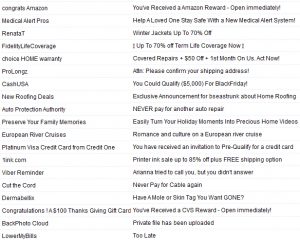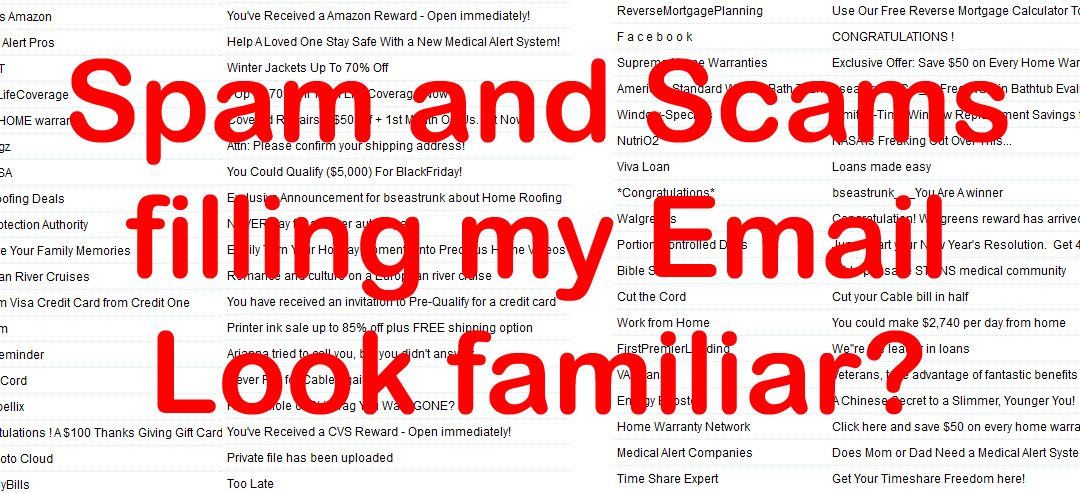One look at my investment portfolio and you know my ability to predict the future is seriously flawed. This trend gives me hope I’m wrong but if history is any guide, no one will be using email 10 years from now. Impossible you say?
Before the advent of robocallers and phone soliciters, we looked forward to the calls we received. As the majority of calls became auto warranty scams and politicians soliciting money, we stopped answering the phone. Sure caller ID helped but voicemail really gave us freedom to ignore all those calls.
In today’s world, unless I recognize your number, you had better leave a message. Odds are extraordinarily high that the person ringing my phone right now has nothing I want. While I still have a land line, I don’t even bother checking caller ID. Based on the very few messages that my callers leave, I’m not missing anything.

Spam and Scams
It looks like email is repeating the same pattern. Over the last week, I been offered a variety of free drugs, I’ve won several thousand in gift cards and amazingly, two of my email addresses were picked at random to receive millions of dollars. The reality is that the majority of these emails are scam.
Not only that but email has raised the stakes for pure disaster. Open the wrong email and you can find yourself locked out of your computer until you figure out how to get enough bitcoin to unlock it. Trust the wrong link and your Facebook account is suddenly spamming all your friends. Follow the helpful link to your bank after being told your account was frozen and watch the money disappear in real time.
The risk of these shysters and criminals wreaking havoc on your digital world is no longer commensurate with the reward of easy use. Nor does email have a caller ID equivalent. You can’t tell who actually sent the email and you have to work to see what the links are. Sometimes it seems like email was intended for the sole purpose of scamming you.

Cajun
Spoofing email addresses is so easy that one of my dogs could do it. Still worse, most of the major hacks started with a phishing email. Over the last twenty years, the biggest improvement in security for email seems to be the ability to turn off automatic loading of pictures.
Don’t bother looking to our Government for help. Congress protected us with the do not call lists for our phones. Anybody out there feel that was effective? Given how consumer friendly the FCC has become, I’m surprised it hasn’t issued an edict telling us we have to open all email attachments.
Why are we still risking our identity and our bank accounts with a system based on security that hasn’t improved in twenty years? That question is largely rhetorical because many of you are already migrating away from email. WhatsApp, Facebook messenger and even the message function on your phone are being used as email substitutes.
At the risk of sounding like a conspiracy nut, the only answer I can come up with is money. There’s absolutely no money in developing a real, secure, standard for email. Unless they can come up with a standard everyone uses we gain nothing. Somehow, I just don’t see a lot of cooperation between Apple, Microsoft and Google. It’s far easier to continue building on a shaky framework established twenty years ago.
On the other hand, if they allow, even encourage, the flaws in conventional email, they can offer people enhanced security through the use of their proprietary service.
Why is this important? In order for you to use their service, you have to verify who you are by registering with their service. As Google proved with their free email, this database of names is valuable. Still, as an enhanced service, you would be expected to pay for it. It’s a good thing nobody would stoop so low as to force you to pay for their software and then inundate you with advertising, cough ‘Windows 10’, that would be unethical.
Of course, just like the security questions with answers known only to you and the millions of people able to use Google, companies always want an email address from you. Then again, they also ask for a phone number and I happily give them my land line number, the one I no longer answer.
If you do nothing else this year, go to Google and open a new mail address. Don’t use it for your bank or anything important, some evils we have to live with. Instead, use it for all the merchants that insist on an email address, all the sites that insist on you signing up for their newsletters, all the places that insist they need your email. Now do yourself a favor and never look at it again.
© 2017 – 2019, Byron Seastrunk. All rights reserved.










